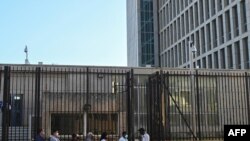For the first time in four years, the United States and Cuba held talks in Washington focusing on migration and the implementation of the U.S.-Cuba Migration Accords. Such meetings had been held semiannually, after the first in a series of bilateral agreements was signed in 1984. The meetings were discontinued after U.S. immigration operations at the embassy in Havana were curtailed following anomalous health incidents among some employees.
On April 21, Deputy Assistant Secretary for Western Hemisphere Affairs Emily Mendrala led the U.S. interagency delegation, and Cuba’s Vice Foreign Minister Carlos Fernandez de Cossio led the Cuban delegation. In a written statement, the State Department said, “The U.S. delegation highlighted areas of successful cooperation on migration, while also identifying issues that have been obstacles to fulfilling the goals of the Accords.”
There has been a significant increase in the number of Cubans seeking entry into the United States in recent months via both maritime and land routes. Cubans depart their country for a range of reasons, but we know that the root causes of irregular migration include a lack of respect for human rights and fundamental freedoms, citizen security, and a lack of economic opportunity.
State Department Spokesperson Ned Price said that resuming migration talks between the United States and Cuba provided “an opportunity for important discussions on mutual compliance with migration accords and the commitment of the United States and Cuba to safe, legal and orderly migration.”
Among the topics discussed were compliance with U.S. immigration law, migration via both land and sea, migration trends, repatriation of citizens, and embassy functions.
The State Department said the discussion of consular services at the U.S. Embassy in Havana included “resumption of immigrant visa services on a limited basis starting in May, current American citizen services, and current issuance of emergency non-immigrant visas.”
“Enabling safe, legal, and orderly migration between Cuba and the United States remains a mutual interest between the United States and Cuba,” the State Department declared, “and is consistent with U.S. interest in fostering family reunification and promoting greater respect for human rights and fundamental freedoms in Cuba.”
U.S. and Cuba Resume Migration Talks

For the first time in four years, the United States and Cuba held talks in Washington focusing on migration and the implementation of the U.S.-Cuba Migration Accords.





